Dutch composer Sylvia Maessen composed a piece called ‘Omar Khayyam. Rubaiyat’ for soprano and six tuned wine glasses (2005). The work is now recorded on CD together with eight other works by Maessen. The songs are performed by Irene Maessen.
A presentation will be held in Amsterdam, February 23, 2014, in Arti & Amicitiae, starting at 17.00 pm.
 Inspired by Poetry, as the CD is called, contains a number of songs, based on texts by a number of Dutch poets, and by Rutebeuf, Khlebnikov and Tullia d’Aragona, in a variety of musical settings.
Inspired by Poetry, as the CD is called, contains a number of songs, based on texts by a number of Dutch poets, and by Rutebeuf, Khlebnikov and Tullia d’Aragona, in a variety of musical settings.
‘Omar Khayyam. Rubaiyat’ is made up of nine quatrains from FitzGerald’s translation. The singer also ‘plays’ the wine glasses by passing a moist finger along the rim of the glasses.
With the CD comes a booklet, with additional information and the text of the poems.
A fragment from the work is available at Maessen’s website. Recently Professor Rokus de Groot, (University of Amsterdam), held a lecture ‘Khayyam in de Nederlandse muziek‘ (available from YouTube), in which he explored some of the musical aspects of the composition.
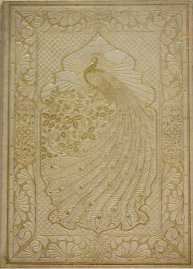
 The Rubaiyat of Omar Khayyam. By E.F. Thompson. Narrated by Mark Turetsky.
The Rubaiyat of Omar Khayyam. By E.F. Thompson. Narrated by Mark Turetsky. The Rubaiyat of Omar Khayyam. Translated by Edward FitzGerald. Narrated by David Calderisi.
The Rubaiyat of Omar Khayyam. Translated by Edward FitzGerald. Narrated by David Calderisi.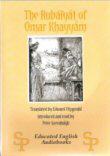 The Rubaiyat of Omar Khayyam. Translated by Edward FitzGerald. Introduced and read by Peter Greenhalgh.
The Rubaiyat of Omar Khayyam. Translated by Edward FitzGerald. Introduced and read by Peter Greenhalgh.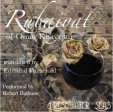 Rubaiyat of Omar Khayyam. By Edward FitzGerald. Narrated by Robert Bethune.
Rubaiyat of Omar Khayyam. By Edward FitzGerald. Narrated by Robert Bethune. Alfred Drake reads The Rubaiyat of Omar Khayyam. By Edward FitzGerald.
Alfred Drake reads The Rubaiyat of Omar Khayyam. By Edward FitzGerald. The Rubaiyat of Omar Khayyam explained. By Paramhansa Yogananda. Narrated by Donald J. Waters.
The Rubaiyat of Omar Khayyam explained. By Paramhansa Yogananda. Narrated by Donald J. Waters. The Bird of Time. Selections from The Rubaiyat of Omar Khayyam explained. Voice and instrumentation by Swami Kriyannda.
The Bird of Time. Selections from The Rubaiyat of Omar Khayyam explained. Voice and instrumentation by Swami Kriyannda.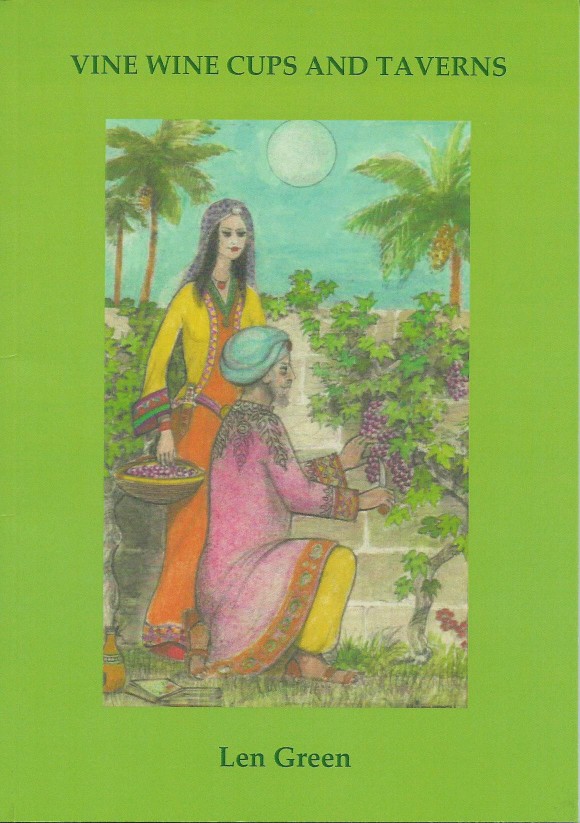 Len Green, from Australia, has just issued another book with selections from various translations of Khayyám’s verses, dedicated almost entirely to Omar’s wine quatrains and everything one needs to enjoy a good bottle: the vine, the grape, the juice, the draught, Saki, cup and cupbearers, bowls and bottles, jugs and jars, flasks and flagons, the rose and the tulip and of course your loved one.
Len Green, from Australia, has just issued another book with selections from various translations of Khayyám’s verses, dedicated almost entirely to Omar’s wine quatrains and everything one needs to enjoy a good bottle: the vine, the grape, the juice, the draught, Saki, cup and cupbearers, bowls and bottles, jugs and jars, flasks and flagons, the rose and the tulip and of course your loved one.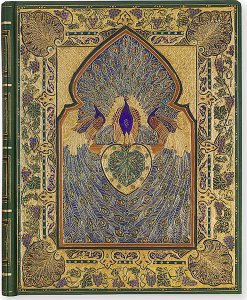 The Peter Pauper Press, well known for a number of editions of the Rubáiyát, have now issued a so called Great Omar Journal, a notebook providing 192 blank, lightly-lined pages “for personal reflection and creative expression”. The covers are taken from the famous Sangorski & Sutcliffe binding.
The Peter Pauper Press, well known for a number of editions of the Rubáiyát, have now issued a so called Great Omar Journal, a notebook providing 192 blank, lightly-lined pages “for personal reflection and creative expression”. The covers are taken from the famous Sangorski & Sutcliffe binding.
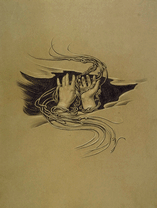 Iowa in 1924. The author explaines that “Omar Khayyám’s nature was profoundly religious, and as a pagan preacher of “righteousness, moderation and judgement to come,” he has a message to millions of our western world who profess and call themselves Christian and yet do not take their profession seriously.”
Iowa in 1924. The author explaines that “Omar Khayyám’s nature was profoundly religious, and as a pagan preacher of “righteousness, moderation and judgement to come,” he has a message to millions of our western world who profess and call themselves Christian and yet do not take their profession seriously.”